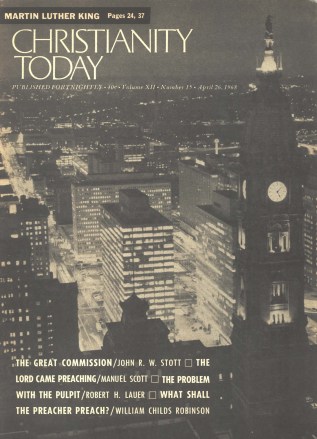What effective sermons have in common
Sensationalism has a new home. Formerly it was associated only with the fundamentalist; now it has come to nest in the liberal pulpit. Jazz, dramatic readings, interpretative dancing, and discussions are replacing the the sermon in some churches. The idea is not that the sermon is completely out of date but rather that preaching must take forms the modern mind can accept.
Traditional preaching is now considered ineffective, and a look at the lives of many church members might lend weight to this stand. But a longer look and a second thought would take the viewer beyond preaching itself to the heart of the problem: the preacher and his message.
If today’s sermon is irrelevant, insipid, and outmoded, is that the fault of the method? Is it not rather the fault of the maker? An ineffective message will be ineffective no matter what form it is presented in. It matters little whether spiritual shallowness is doled out as a discourse or as a dance; it is still shallowness. I heard one of the popular disc jockeys in our area say one day on his program, “I have heard very few good sermons since coming to St. Louis. Why don’t they challenge us more?” He was complaining, not about the method of preaching, but about the message of the preacher.
My own experience confirms this. In my youth I attended Protestant churches of at least four different denominations. I can remember filling in the o’s on dozens of bulletins in an attempt to escape from boredom. Not until I was twenty and went to a Billy Graham meeting did I hear, for the first time in my life, that I needed to be saved.
What had I heard before? Ethics. Ethics garnished with Christian words, but still ethics without redemption. The problem with preaching today is that too many preachers are trying to teach unregenerate men how to live as Christians. This is dangerous. As Gerard Groote wrote, “Nothing is so dangerous as to preach about God and perfection, and not to point out the way which leads to perfection.”
The world has never lacked for ethical systems. High ideals are not confined to the Christian tradition. What the world has lacked is a way to find the salvation that is the necessary foundation for righteousness. The problem with preaching is that too often it has skipped the laying of a foundation and plunged blindly into constructing a building.
An old Anabaptist confession of faith says: “To command virtue in reliance upon human strength, is nothing else than to command one to fly without wings.” Little wonder that many sermons leave hearers frustrated.
P. T. Forsyth has described what he considers to be the chief temptation of the Church:
The reformation of society by every beneficent means except the evangelical; by amelioration, by reorganization, by programmes, and policies, instead of by the soul’s new creation … the temptation to save men by rallying their goodness without routing their evil, by reorganizing virtue instead of redeeming guilt [The Person and Place of Jesus Christ, London, 1955, p. 303].
As long as preaching falls before this temptation, it will remain ineffective.
But the power of biblical preaching is unabated. It remains God’s chosen method to reach the world (1 Cor. 1:18–21). And the power of Billy Graham, Sam Shoemaker, Oswald Smith, and many others bears ample witness to the continuing effectiveness of the sermon. What do the sermons of these effective preachers of today have in common?
At least three elements:
1. Simplicity. The sermon that is laden with philosophical or psychological terms and concepts is likely to miss its mark. The largest individual vocabulary ever measured, reports Terry C. Smith in How to Write Better and Faster, included only 10 per cent of the approximately 600,000 words in the dictionary. The man on the street is said to know fewer than 2 per cent of these words, while an educated man may know a little more than 3 per cent.
Today much emphasis is placed on communicating effectively through simple, concrete words. The preacher must learn to do this. Read a sermon by Billy Graham, or one of Dr. Shoemaker’s books. You will not need a dictionary of words or of philosophical concepts to understand what these men are saying.
2. Authority. When “Thus saith the Lord” is replaced by “some theologians think” and “most psychologists agree,” the power of the sermon rapidly drains away. Mark Twain vividly illustrated the uselessness of being equivocal when he was sent to cover an important social event for a newspaper. His editor had warned him to state only facts he could verify from his own knowledge, and so he turned in this story: “A woman giving the name of Mrs. James Jones who is reported to be one of the society leaders in the city gave what is reported to be a party yesterday to a number of alleged ladies. The hostess claims to be the wife of a reputed attorney.”
Effective preaching is rooted in the authority of the Bible. A skeptical physician who was converted under the preaching of D. L. Moody said, “I tell you, Moody’s power is in the way he has his Bible at the tip of his tongue.” When the preacher uses the Bible only as a springboard for a social treatise, or when he tears it to shreds in an effort to decide what parts he can consider reliable, his message will have no force. But when the Bible is proclaimed in its fullness, the power of God will be at work.
3. Focus on Christ. Preaching must center on God’s estimate of man, not on man’s estimate of God. Its heart must be the redemption of man by the power of God, not the redemption of society by the efforts of man. It should reflect the great central emphasis of Paul, who declared to the Corinthians, “I determined to know nothing among you, save Jesus Christ, and him crucified” (1 Cor. 2:2).
When George Fox was seeking spiritual guidance, he walked seven miles to talk to a clergyman who had a reputation for being helpful, “but I found him but like an empty hollow cask.” The problem with preaching is that so often people come seeking the water of life, only to find an empty cask. But sometimes they find water—when the preacher with simplicity and authority proclaims Jesus Christ.
Milton D. Hunnex is professor and head of the department of philosophy at Willamette University, Salem, Oregon. He received the B.A. and M.A. degrees from the University of Redlands and the Ph.D. in the Inter-collegiate Program in Graduate Studies, Claremont, California. He is author of “Philosophies and Philosophers.”










